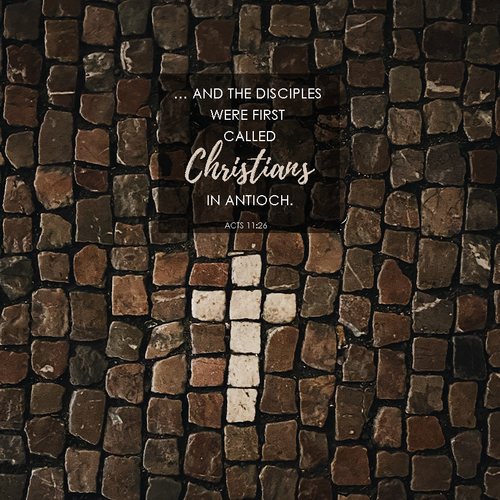The Disciples First Called Christians in Antioch

No events are as pivotal to our understanding of the early church in the Book of Acts as those surrounding Cornelius and his household. Although the Lord Jesus had told the apostles to "make disciples of all the nations", it is clear that the early church was initially reluctant to take the Gospel globally. This reluctance is illustrated in Acts Chapters 10 and 11.
The expansion was controversial due to two major issues. The first was whether Gentiles had to become Jews first, especially by getting circumcised and practicing Mosaic dietary laws, in order to become Christians. After the Holy Spirit interrupted his message and descended on Cornelius and his household, the Apostle Peter became convinced that Gentiles didn't need to become Jews first. When he justified his actions before the church, he told them, "If God gave [the Gentiles] the same gift as He gave to us also after believing in the Lord Jesus Christ, who was I that I could stand in God’s way?" (Acts 11:17). The Apostle Peter had no doubt that God had accepted uncircumcised Gentiles into the church. Although the Apostle Paul would, later on, have to publicly rebuke him for withdrawing from eating with Christian Gentiles, the basis of Paul 's rebuke was that by that time Peter himself had no longer lived as Jew, following Mosaic dietary laws, which bring us to the second issue for why taking the Gospel globally was controversial.
The Apostle Peter’s vision at Joppa regarding clean and unclean foods may have seemed irrelevant to taking the Gospel globally. However, since Gentiles did not follow Mosaic dietary laws, Jewish Christians struggled with how it would even be possible to associate with Gentiles and still keep these laws themselves. The "circumcised" believer did not take issue with the Apostle Peter taking the Gospel to Cornelius's household as much as with going into a Gentile's house and eating with them (cf. Acts 11:3). However, both issues were settled for the Apostle Peter in his experience with Cornelius because he was convinced that God accepted Gentiles without circumcision and that he could himself in good faith enjoy fellowship with his brothers in Christ, Jew or Gentile.
The issues were not, however, fully settled for some Jewish Christians as a whole. Both issues will resurface at the council in Jerusalem after the Apostle Paul took the Gospel to the Gentiles on a wide scale (cf. Acts 15). More relevant to our immediate context in Chapter 11, we see that as believers "made their way to Phoenicia and Cyprus and Antioch", they spoke the word "to no one except to Jews alone" (Acts 11:19). However, some men from Cyprus and Cyrene, who perhaps were less strict in their observances of Mosaic laws, "came to Antioch and began speaking to the Greeks" about the Lord Jesus (Acts 11:20). When Barnabas was sent from Jerusalem, he "witnessed the grace of God...rejoiced and began to encourage them...And considerable numbers were brought to the Lord" (Acts 11:23-24). He also brought the Apostle Paul and they taught the new believers for an entire year (Acts 11:26).
We also see in Acts 11:26 that "the disciples were first called Christians in Antioch." This is perhaps due to the Gentile nature of the church in Antioch. The church had started to take on a distinct identity from that of the Jewish community. The church had started to understand that Gentiles did not need to become Jews. However, Jews did not need to become Gentiles either, and we see that in modern-day messianic congregations. Scripture is clear that we have freedom in Christ so we must exercise caution from inverting the attitude of the early church (cf. Rom. 14:1–5). Furthermore, we must exercise caution when taking the Gospel to a new culture so that we do not mix the message of the Gospel with our cultural practices and preference nor impose them on others. We should say with the Apostle Paul:
- The Apostle Peter himself resisted the vision given to him at the tanner's house (cf. Acts 10:14)
- God affirmed what He wanted to do twice, with two visions to the Apostle Peter (Acts 10:9–16) and with Cornelius (Acts 10:1–8) and revealed to each one what he had revealed to the other.
- Luke, under the inspiration of the Holy Spirit, found it necessary to list the same events twice, sometimes word for word.
- The authenticity of the matter had to be confirmed through the Holy Spirit (Acts 10:44–48) who "fell upon" the Gentiles without the Apostle Peter laying his hands on them and without any prompting from him unlike what happened at Samaria.
- The "circumcised" believers "took issue" with Peter going to Cornelius's home (Acts 11:2).
- This expansion of the message of the Gospel necessitated a defense of its legitimacy and a justification of its validity before the church.
The expansion was controversial due to two major issues. The first was whether Gentiles had to become Jews first, especially by getting circumcised and practicing Mosaic dietary laws, in order to become Christians. After the Holy Spirit interrupted his message and descended on Cornelius and his household, the Apostle Peter became convinced that Gentiles didn't need to become Jews first. When he justified his actions before the church, he told them, "If God gave [the Gentiles] the same gift as He gave to us also after believing in the Lord Jesus Christ, who was I that I could stand in God’s way?" (Acts 11:17). The Apostle Peter had no doubt that God had accepted uncircumcised Gentiles into the church. Although the Apostle Paul would, later on, have to publicly rebuke him for withdrawing from eating with Christian Gentiles, the basis of Paul 's rebuke was that by that time Peter himself had no longer lived as Jew, following Mosaic dietary laws, which bring us to the second issue for why taking the Gospel globally was controversial.
The Apostle Peter’s vision at Joppa regarding clean and unclean foods may have seemed irrelevant to taking the Gospel globally. However, since Gentiles did not follow Mosaic dietary laws, Jewish Christians struggled with how it would even be possible to associate with Gentiles and still keep these laws themselves. The "circumcised" believer did not take issue with the Apostle Peter taking the Gospel to Cornelius's household as much as with going into a Gentile's house and eating with them (cf. Acts 11:3). However, both issues were settled for the Apostle Peter in his experience with Cornelius because he was convinced that God accepted Gentiles without circumcision and that he could himself in good faith enjoy fellowship with his brothers in Christ, Jew or Gentile.
The issues were not, however, fully settled for some Jewish Christians as a whole. Both issues will resurface at the council in Jerusalem after the Apostle Paul took the Gospel to the Gentiles on a wide scale (cf. Acts 15). More relevant to our immediate context in Chapter 11, we see that as believers "made their way to Phoenicia and Cyprus and Antioch", they spoke the word "to no one except to Jews alone" (Acts 11:19). However, some men from Cyprus and Cyrene, who perhaps were less strict in their observances of Mosaic laws, "came to Antioch and began speaking to the Greeks" about the Lord Jesus (Acts 11:20). When Barnabas was sent from Jerusalem, he "witnessed the grace of God...rejoiced and began to encourage them...And considerable numbers were brought to the Lord" (Acts 11:23-24). He also brought the Apostle Paul and they taught the new believers for an entire year (Acts 11:26).
We also see in Acts 11:26 that "the disciples were first called Christians in Antioch." This is perhaps due to the Gentile nature of the church in Antioch. The church had started to take on a distinct identity from that of the Jewish community. The church had started to understand that Gentiles did not need to become Jews. However, Jews did not need to become Gentiles either, and we see that in modern-day messianic congregations. Scripture is clear that we have freedom in Christ so we must exercise caution from inverting the attitude of the early church (cf. Rom. 14:1–5). Furthermore, we must exercise caution when taking the Gospel to a new culture so that we do not mix the message of the Gospel with our cultural practices and preference nor impose them on others. We should say with the Apostle Paul:
For I determined to know nothing among you except Jesus Christ, and Him crucified.
(1 Corinthians 2:2)
(1 Corinthians 2:2)
Posted in Book of Acts
Recent
Habakkuk 2:4b — The Just Shall Live By Faith
February 20th, 2026
Habakkuk 1:12–2:1— Appealing to the Throne of God
February 13th, 2026
Habakkuk: Trusting God in Troubled Times
February 6th, 2026
John 20:18–31 — Believing is Seeing
January 16th, 2026
John 20:1–17 — Love Turns Grief into a Mission
January 10th, 2026
Archive
2026
2025
October
2024
February
March
April
May
July
October
November
December
Advent 2024 Devotion: December 2Advent 2024 Devotion: December 3Advent 2024 Devotion: December 4Advent 2024 Devotion: December 5Advent 2024 Devotion: December 6John 3:16-21 — For God So Loved the WordAdvent 2024 Devotion: December 7Advent 2024 Devotion: December 8Advent 2024 Devotion: December 9Advent 2024 Devotion: December 10Advent 2024 Devotion: December 11Advent 2024 Devotion: December 12Advent 2024 Devotion: December 13Advent 2024 Devotion: December 14Advent 2024 Devotion: December 15Advent 2024 Devotion: December 16Advent 2024 Devotion: December 17Advent 2024 Devotion: December 18Advent 2024 Devotion: December 19Advent 2024 Devotion: December 20Advent 2024 Devotion: December 21Advent 2024 Devotion: December 22Advent 2024 Devotion: December 23Advent 2024 Devotion: December 24Advent 2024 Devotion: December 25
2023
January
February
March
April
May
